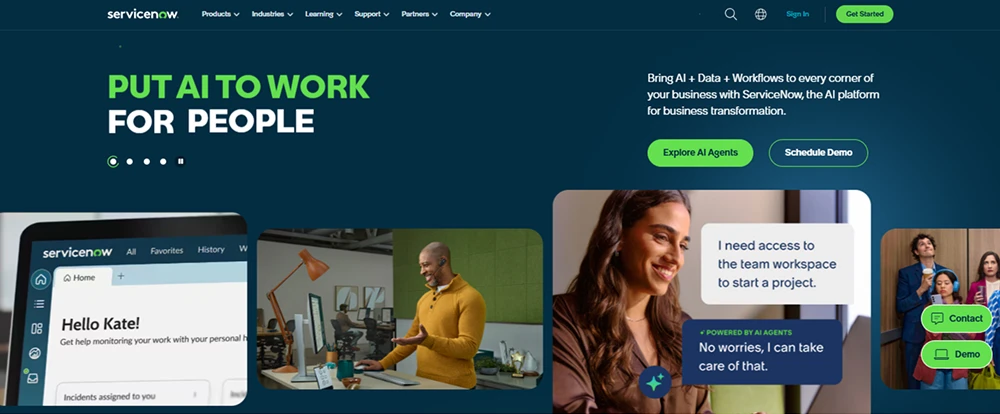ServiceNow Overview & 2026 Industry Position
ServiceNow is a leading digital workflow platform empowering enterprises to automate, connect, and transform critical business operations. Positioned at the forefront of cloud-based service delivery, ServiceNow serves over 7,000 organizations globally, including nearly 80% of the Fortune 500. In 2026, amid growing prioritization of AI and real-time service orchestration, ServiceNow thrives as a flexible backbone for IT, HR, Customer Service, and beyond. Its cross-functional workflow capabilities and low-code platform make it a strategic enabler for enterprise-wide digital transformation in industries ranging from healthcare to finance.
From Launch to 2026: ServiceNow’s Journey
Founded in 2004 by Fred Luddy, ServiceNow initially emerged as a Platform-as-a-Service (PaaS) focused on IT Service Management (ITSM). The company launched its first ITSM cloud solution in 2007 and gained momentum throughout the 2010s, becoming a publicly traded company in 2012. Subsequent years saw expansion into HR, customer service, and security operations. Notable milestones include:
- 2017 – Introduction of the Now Platform
- 2019 – Launch of the Madrid release with native AI capabilities
- 2020 – Acquisition of Element AI to deepen AI features
- 2022 – Debut of Industry Solutions for Telecom and Banking
- 2023 – Introduction of ServiceNow Impact for performance insights
In 2026, ServiceNow doubles down on generative AI, embedded ESG workflows, and enterprise-wide orchestration—solidifying its role as the intelligent workflow core of modern business IT portfolios.

ServiceNow Key Features
- Now Platform® – A unified cloud platform offering low-code tools, AI automation, and a unified data model.
- ITSM & ITOM – AI-powered ticketing, change management, and observability tools to optimize IT operations.
- HR Service Delivery – End-to-end employee lifecycle support, including onboarding and case management.
- Customer Service Management (CSM) – Proactive issue resolution, omnichannel support, and virtual agents.
- Security Operations (SecOps) – Threat intelligence, automated orchestration, and incident response workflows.
- Industry-specific solutions – Customized workflows for manufacturing, telecom, healthcare, and financial services.
- Generative AI & Predictive Intelligence – ML models and GenAI explainers to fast-track issue resolution and productivity.
Workflow & UX
ServiceNow delivers a polished user experience built around persona-driven workflows. Dashboards are customizable and rely heavily on AI-assisted suggestions and KPIs. Key navigation enhancements in 2026 include:
- Unified workspaces for IT, HR, and Customer teams
- Low-code Studio for builders with prebuilt components and flows
- AI chatbots integrated natively in employee and customer portals
- Adaptive knowledge base with self-service insights
These features lower the barrier to enterprise-wide adoption while preserving robust admin controls and audit functionality.
ServiceNow Pricing Analysis & Value Metrics
| Edition | Monthly Pricing (User-Based) | Includes |
|---|---|---|
| ITSM Standard | $100 per user | Incident, Change, Problem Mgmt, Knowledge Base |
| Professional | $150 per user | + AI Automations, Virtual Agents, Configuration Mgmt |
| Enterprise | Custom Quote | + Predictive AIOps, Process Optimization, Industry Features |
Value Assessment: While premium-priced, ServiceNow offers deep ROI through automation, productivity lifts, and lowered system downtime—particularly in IT-heavy environments.
Competitive Landscape
| Platform | Differentiators | Pricing | Best for |
|---|---|---|---|
| ServiceNow | Full-funnel workflows, AI-native, low-code tools | Mid–High | Large enterprises, IT-intensive orgs |
| Zendesk | Customer service focus, fast UI | Mid | SMBs, support teams |
| Atlassian Jira | Agile/project management + IT workflows | Low–Mid | Tech firms, dev-driven teams |
| BMC Helix | Multi-cloud AIOps, compliance features | High | Gov, regulated industries |
Use Cases
- Global IT service desks streamlining incident handling and change requests.
- Retail HR departments automating onboarding workflows and employee support.
- Healthcare orgs coordinating patient support and compliance cases.
- Financial firms accelerating risk remediation through integrated SecOps.
- Insurance providers deploying AI chatbots for client-facing resolutions.
Integrations
ServiceNow supports a rich ecosystem with 1,000+ integration points across IT and business software:
- CRM: Salesforce, HubSpot, Microsoft Dynamics
- IT Tools: Splunk, Datadog, SolarWinds
- Productivity: Microsoft 365, Slack, Zoom
- ERP & Finance: Workday, Oracle, SAP
- HR: ADP, BambooHR, Greenhouse
Its IntegrationHub provides drag-and-drop connectivity and Flow Designer enables no-code orchestration, boosting flexibility without development overheads.
Pros & Cons
- Pros:
- End-to-end workflow unification
- Built-in AI support and automation tools
- Extensive modular coverage across business functions
- Reliable scalability and governance
- Cons:
- Higher upfront investment for smaller orgs
- Steep learning curve for new users
- Customization may require certified developers
Pro Tip: Use “Flow Designer” and “IntegrationHub” together to streamline cross-app workflows without writing code.
Final Thoughts
ServiceNow remains an enterprise-grade workflow platform best suited to medium-to-large organizations with cross-departmental automation goals. It’s particularly effective in IT-heavy and compliance-driven fields. While pricing and complexity could deter smaller teams, the return on process efficiency, uptime, and user satisfaction often offsets costs. For organizations looking to unify operations and leverage AI-driven orchestration at scale, ServiceNow is a top-tier choice in 2026.
ServiceNow FAQ
Top industries include IT services, healthcare, finance, telecom, and government—anywhere complex workflows need orchestration and compliance.
It can be used by SMBs, but the ROI is clearest at scale. Alternative lighter platforms may be more cost-effective for small teams.
Yes, ServiceNow provides developer sandboxes and demo environments upon request through their Developer Program.
Yes. The App Engine allows you to build and deploy internal apps using low-code tools and prebuilt templates.
ServiceNow meets industry standards like ISO 27001, HIPAA, and FedRAMP. It features role-based access, encryption, and audit tools.


